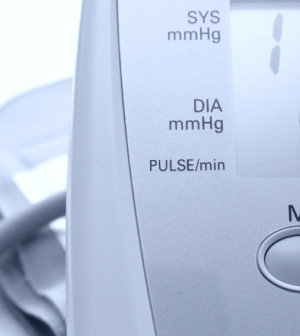- 10 Strategies to Overcome Insomnia
- Could Artificial Sweeteners Be Aging the Brain Faster?
- Techniques for Soothing Your Nervous System
- Does the Water in Your House Smell Funny? Here’s Why
- Can a Daily Dose of Apple Cider Vinegar Actually Aid Weight Loss?
- 6 Health Beverages That Can Actually Spike Your Blood Sugar
- Treatment Options for Social Anxiety Disorder
- Understanding the Connection Between Anxiety and Depression
- How Daily Prunes Can Influence Cholesterol and Inflammation
- When to Take B12 for Better Absorption and Energy
Some Blood Pressure Drugs May Be Risky for Certain Surgery Patients


Some people on blood pressure drugs called beta blockers may face heightened risks of heart complications during non-cardiac surgeries, a new, large study suggests.
The research involved over 55,000 surgery patients who were on various drugs to treat high blood pressure. The investigators found that those on beta blockers had a higher risk of heart attack, stroke or related death, compared to patients on other medications.
Overall, 1.3 percent suffered one of those complications within 30 days of surgery, compared with 0.8 percent of patients on other blood pressure drugs.
It’s not certain that beta blockers, themselves, are to blame, said lead researcher Dr. Mads Jorgensen, of the University of Copenhagen, in Denmark.
And, he stressed, the study included only people with “uncomplicated” high blood pressure — and not those with heart problems. Heart patients might get some benefit from a beta blocker if they’re having surgery, Jorgensen explained.
But the findings add to evidence that beta blockers can pose a hazard to some patients having non-cardiac surgery, he added.
The findings were published online Oct. 5 in JAMA Internal Medicine.
Beta blockers include drugs like metoprolol (Lopressor, Toprol XL), nadolol (Corgard) and propranolol (Inderal LA). They are prescribed to help treat high blood pressure, especially for people who have had a heart attack or suffer from chronic heart failure.
For years, beta blockers were also routinely prescribed ahead of surgical procedures — of all kinds — for people who might have an increased risk of heart complications, Jorgensen explained.
“Back in the day, we felt confident that patients needed beta blockers,” he said.
That was based on evidence that the drugs can cut the risk of heart attack and other heart complications during or soon after surgery.
However, more recent research has shown that beta blockers may also raise the risks of stroke, and dangerous drops in blood pressure and heart rate.
“For a while now, doctors have been debating whether they’re truly helpful,” said Dr. Andrew Freeman, director of clinical cardiology at National Jewish Health, in Denver.
“This study suggests that if you have [high blood pressure], but are otherwise relatively healthy, it might make sense to back off of your beta blocker before surgery,” said Freeman, who is also a member of the Patient-Centered Care Committee for the American College of Cardiology (ACC).
“But,” he added, “we don’t know for sure.”
Both he and Jorgensen stressed that people preparing for surgery should not stop taking their medication on their own.
The findings are based on more than 55,000 Danish patients who underwent a non-cardiac surgical procedure between 2005 and 2011. All were on at least two medications to control chronic high blood pressure — including 14,000-plus who were using a beta blocker.
Overall, the study found, beta-blocker patients had up to double the risk of a major cardiovascular complication — a heart attack, stroke or death from cardiovascular causes.
However, the finding is only an association, noted Dr. Gregg Fonarow, a professor of cardiology at the University of California, Los Angeles. That means there could be other explanations for the greater risks with beta blockers, he said.
According to the current guidelines from the ACC, people who are already on a beta blocker should stay on the medication when they undergo surgery.
For people not on a beta blocker, the ACC says, it is “reasonable” to start one in the weeks before surgery — but only if they have a high risk of heart complications. That includes people with multiple risk factors, such as diabetes, a recent heart attack, kidney disease or heart failure.
Freeman agreed that for high-risk patients, the protective effects of beta blockers may outweigh the downsides. But he said for lower-risk patients — people like those in this latest study — the risks may not be worth it.
Why would beta blockers do harm? The drugs work by making the heart beat more slowly and with less force — which might blunt the body’s natural response to the stress of surgery, Freeman explained.
Jorgensen agreed. “Surgery is a big stress, and the body needs to accommodate that,” he said. “Beta blockers put on a lid on the heart’s response.”
Freeman suggested that people already on a beta blocker talk to their doctor ahead of surgery about whether it’s necessary to stay on the drug.
That discussion is vital, Jorgensen said, because stopping a beta blocker on your own is never wise.
Plus, he added, “we can’t conclude from this study that stopping your beta blocker will lower your risk of [surgery] complications.”
More information
The American Board of Internal Medicine Foundation has advice on preparing for surgery.
Source: HealthDay
Copyright © 2026 HealthDay. All rights reserved.










